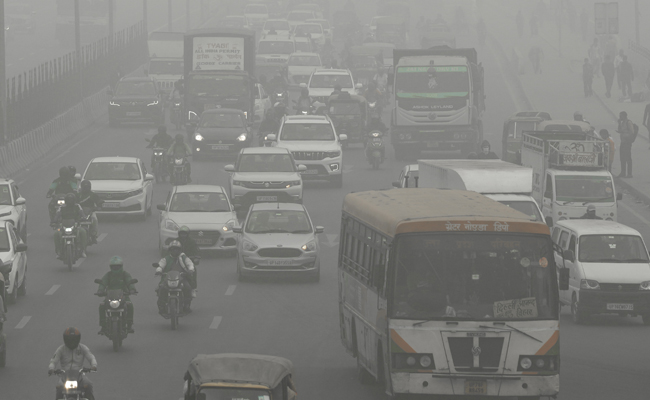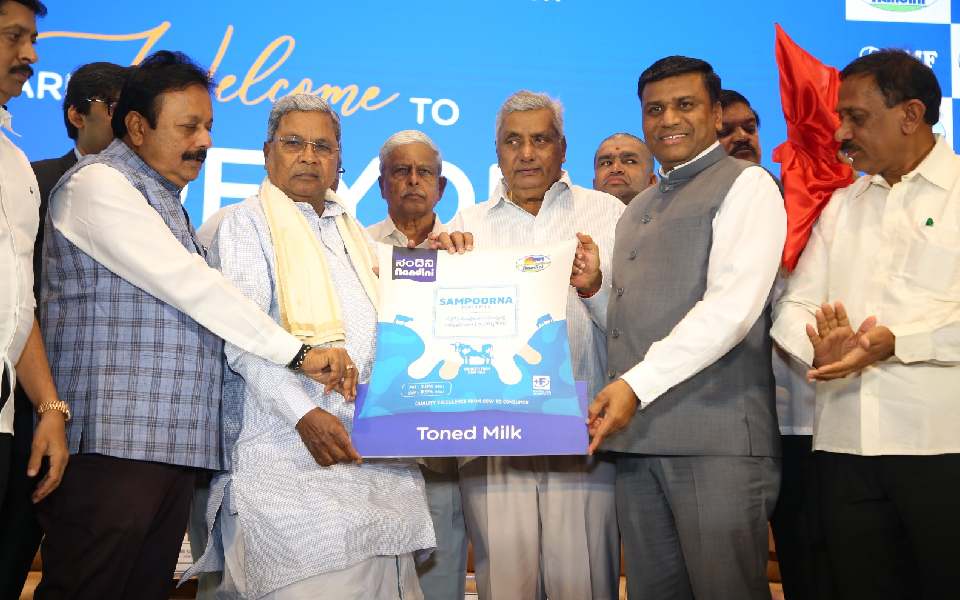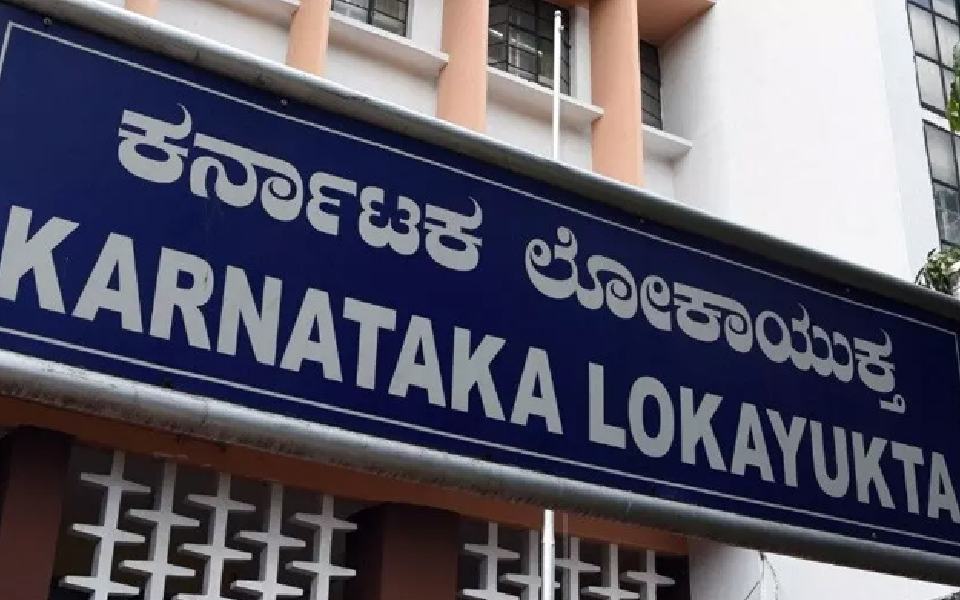New Delhi (PTI): Flagging delay in implementation of stricter measures for checking the alarming rise in pollution, the Supreme Court on Monday asked the Delhi-NCR states to immediately set up teams to enforce GRAP 4 restrictions which, it said, will remain in effect even if the AQI is below 450.
A bench of Justices Abhay S Oka and Augustine George Masih said it is the constitutional duty of all states to ensure all citizens live in a pollution-free environment.
"We direct restrictions under stage 4 of GRAP to continue even if AQI level falls below 450," the bench said.
It asked all Delhi-NCR states to immediately take a call on conducting physical classes up to class 12 and directed the setting up of a mechanism where complaints can be made for violation of restrictions under stage 4 of the Graded Response Action Plan (GRAP).
At the outset, the bench questioned the Delhi government and the Commission for Air Quality Management (CAQM) over the delay in invoking pollution preventive measures under GRAP stages.
The counsel for the Delhi government informed the bench that stage 4 of GRAP has been implemented from Monday and heavy vehicles have been banned from entering the national capital.
"GRAP stages should be implemented immediately the moment AQI level touches alarming levels. Some sense of urgency needs to be there," the bench said.
“The moment the AQI reaches between 300 and 400, stage 4 has to be invoked. How can you take risk in these matters by delaying applicability of stage 4 of GRAP,” the bench told the counsel.
It said that the CAQM waited for improvement in weather conditions instead of implementing different stages of GRAP over alarming rising pollution levels.
Asking the Delhi government and neighbouring NCR states to file their compliance affidavit by November 22 on the implementation of preventive measures to check pollution, the bench said steps may be taken besides those suggested under GRAP.
First implemented in 2017, the GRAP is a set of anti-air pollution measures followed in the capital and its vicinity according to the severity of the situation.
It classifies the air quality in the Delhi-NCR under four different stages: Stage 1 - 'poor' (AQI 201-300), Stage 2 - 'very poor' (AQI 301-400), Stage 3 - 'severe' (AQI 401-450) and Stage 4 - 'severe plus' (AQI above 450).
On Sunday, the CAQM announced stricter pollution control measures for the Delhi-NCR under GRAP-4, effective from 8 am on Monday, including a ban on truck entry and a temporary halt on construction at public projects.
The CAQM issued the order as Delhi's Air Quality Index (AQI) worsened, reaching 441 at 4 pm and rising to 457 by 7 pm due to unfavourable weather conditions.
According to the order, no trucks would be allowed into Delhi except for those carrying essential items or using clean fuel (LNG/CNG/BS-VI diesel/electric).
Non-essential light commercial vehicles registered outside Delhi will also be prohibited, except for EVs and CNG and BS-VI diesel ones.
On November 14, the top court agreed to urgently list the plea after it was told that Delhi should not become the most polluted city in the world due to the rising pollution.
It had earlier said the right to live in a pollution-free atmosphere was a fundamental right of every citizen, protected by Article 21 of the Constitution.
The apex court is hearing a plea seeking directions to curb air pollution in the national capital and adjoining areas.
Let the Truth be known. If you read VB and like VB, please be a VB Supporter and Help us deliver the Truth to one and all.
New Delhi, Nov 21: Karnataka Chief Minister Siddaramaiah on Thursday launched the Karnataka Milk Federation's (KMF) Nandini brand milk products in the Delhi-NCR market, pricing them marginally lower than competitors to gain a foothold in the region.
The cooperative will retail four cow milk variants, curd, and buttermilk from Friday, with competitive pricing that undercuts established players like Mother Dairy and Amul.
Cow milk will be sold at Rs 56 per litre, full Cream Milk at Rs 67 per litre, Standardised Milk at Rs 61 per litre, Toned Milk at Rs 55 per litre, and curd at Rs 74 per kg.
"We have surplus milk in the state. KMF along with Mandya Milk Union will market surplus milk of 3-4 lakh litres per day in Delhi-NCR," Siddaramaiah told reporters after launching the products.
The federation currently collects 100 lakh litres of milk daily, with local consumption at 60 lakh litres, leaving a surplus of 40 lakh litres for expansion into new markets.
However, the Chief Minister acknowledged the challenges of transporting milk over 2,500 km, which takes 50-54 hours.
There is a need to find new markets for surplus milk and gradually the KMF should be able to sell 5-6 lakh litres per day in Delhi-NCR, he added.
KMF Chairman LBP Bheemanaik assured that milk quality would be maintained during transit.
The federation has already partnered with 40 dealers in the Delhi-NCR region to facilitate sales, he added.
With a robust infrastructure of 26.76 lakh milk producers, 15,737 dairy cooperative societies, and 15 district milk unions, KMF has a turnover of Rs 25,000 crore and exports dairy products to over 25 countries.
State Animal Husbandry Minister K Venkatesh and Agriculture Minister N Cheluvarayaswamy were present at the product launch.
ದೇಶದ ಹಾಲು ಉತ್ಪಾದನೆಯಲ್ಲಿ ಗುಜರಾತ್ ಮೊದಲ ಸ್ಥಾನದಲ್ಲಿದ್ದರೆ, ಕರ್ನಾಟಕ ಎರಡನೇ ಸ್ಥಾನದಲ್ಲಿದೆ.
— Siddaramaiah (@siddaramaiah) November 21, 2024
ದೆಹಲಿ ನಗರದಲ್ಲಿ ಕೆ.ಎಂ.ಎಫ್ ಮತ್ತು ಮಂಡ್ಯ ಹಾಲು ಒಕ್ಕೂಟಗಳು ಸೇರಿಕೊಂಡು ವಿವಿಧ ಶ್ರೇಣಿಯ ಹಾಲನ್ನು ಮಾರುಕಟ್ಟೆಗೆ ಬಿಡುಗಡೆ ಮಾಡಿವೆ. ದೆಹಲಿಯ ನಿವಾಸಿಗಳಿಂದ ನಂದಿನಿ ಉತ್ಪನ್ನಗಳಿಗೆ ಅತ್ಯುತ್ತಮ ಸ್ಪಂದನೆ ದೊರೆಯಲಿದೆ ಎಂಬ ವಿಶ್ವಾಸ ನನಗಿದೆ.… pic.twitter.com/yUmTQknGzD





